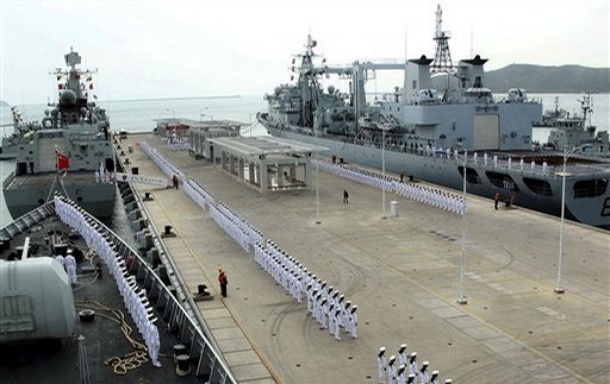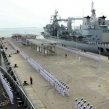
China Flaunts Growing Naval Capabilities
Publication: China Brief Volume: 9 Issue: 1

The year 2009 is set to become a watershed in the People’s Liberation Army’s (PLA) development into a force capable of long-distance, multi-pronged power projection. This is despite the perception that owing to the global recession, the Chinese Communist Party (CCP) leadership under President Hu Jintao is preoccupied with its multi-billion dollar effort to resuscitate the economy and generate jobs. Even as three ultra-modern naval vessels (two destroyers and a supply ship) are steaming around the Gulf of Aden on an "anti-piracy mission," the Ministry of National Defense (MND) has indirectly admitted that the country is building aircraft carriers. Various PLA officers have waxed eloquent on the imperative of enhancing the forces’ “combat-readiness”—and their ability to win high-tech warfare. Moreover, a gargantuan military parade is being planned for October 1, when Beijing will mark the 60th anniversary of the founding of the People’s Republic of China (Yangtze Evening Post [Nanjing], January 4).
Less than a month after President Hu celebrated with big fanfare the 30th anniversary of Deng Xiaoping’s reform and open door policy, the Hu leadership seems to have jettisoned two key Deng dogmas. Firstly, the late patriarch said in the early 1990s that China must “keep a low profile and never take the lead” in foreign and national-security issues. Deng, who presided over the demobilization of a million soldiers through the 1980s, also told the party’s top brass that frugality must be observed because army-building must sub-serve the overall national goal of economic construction. Yet, since the Beijing Olympics last August, China’s military establishment seems to have been unreservedly showing off its hard-power projection capabilities. This is despite the fact that flaunting the country’s military muscle in the apparent pursuit of national glory could stoke the “China threat” theory. Given the PLA’s propensity for acquiring big-ticket, state-of-the-art hardware, the armed forces will likely enjoy double-digit annual budget boosts in the foreseeable future.
First came the Shenzhen astronauts’ ultra-ambitious moon mission, including a 15-minute “space walk” accomplished in late September 2008. While the naval expedition to waters off Somalia was billed as China’s contribution to the global effort against piracy, it seems clear that the top brass is also using the mission to test the long-distance capability of China’s inchoate blue-water navy. According to military expert Qing Yan, the sortie into the Gulf of Aden could become “a major milestone in China’s attainment of blue-water navy capacities.” Qing said that the trip would help China’s best naval vessels adapt themselves to the climate, magnetic fields and geopolitics of faraway waters. It could also be a trial run for China’s future aircraft carrier battle group in terms of logistics, information gathering, IT warfare, and so forth (Ming Pao [Hong Kong], December 26, 2008; Nanfang Weekly [Guangzhou], December 25, 2008). Indeed, while revealing details about the naval maneuver, MND spokesman Huang Xueping indirectly admitted that China was putting together its first aircraft carrier. “An aircraft carrier is a symbol of a nation’s comprehensive strength,” he said. “It also meets the basic requirements of a nation’s navy.” PLA experts have since reported that naval shipbuilders are constructing at least two flattops for possible deployment after 2015 (Asahi Shimbun [Tokyo], December 31, 2008; Ming Pao, January 1).
There are also signs that Beijing is making subtle revisions of the so-called “peaceful rise” theory, which was advanced by the Hu Jintao leadership in 2003 to reassure Asia-Pacific nations that the emerging quasi-superpower would not pose a threat to its neighbors. Official military analysts are now saying that to attain a global status commensurate with China’s comprehensive strength, the PLA should not only seek sophisticated weapons but also be constantly primed for warfare to defend China’s core interests. According to General Zhang Zhaoyin, the PLA must abandon the outdated doctrine of “building a peace-oriented army at a time of peace.” Writing in the official Liberation Army Daily, General Zhang pointed out that “preparing for battle, fighting wars, and winning wars have always been the fundamental tasks of the army.” “The PLA must never deviate from the doctrine of ‘being assiduous in preparing for warfare, and seeking to win wars’,” added Zhang, who is the deputy commander of a Group Army in the Chengdu Military Region. According to Zhang, “Army construction must revolve around the core of raising our ability to win wars.” (Liberation Army Daily, December 2, 2008)
At the same time, well-known military commentator Jin Yinan posited the theory that “China can not emerge in the midst of nightingale songs and swallow dances,” a reference to the placid pleasures of peacetime. Jin, a Professor of International Relations at National Defense University, indicated that China had to “hack out a path through thorns and thistles” in its search for greatness. “When a country and a people have reached a critical moment, the armed forces often play the role of pivot and mainstay [in ensuring that national goals are met],” Jin noted. “Even in peace time, soldiers need to be ever-ready for battles, so that they can throw themselves into action at any time.” Referring to China’s domestic and international goals in the 21st century, Jin pointed out that PLA personnel should “acquit themselves of the responsibility of history and become the vanguard of the Chinese race” (Liberation Army Daily, December 31, 2008). In another controversial article, Liberation Army Daily commentator Huang Kunlun raised the notion of “the boundaries of national interests.” Huang argued that China’s national interests had gone beyond its land, sea and air territories to include areas such as the vast oceans traversed by Chinese freighters as well as outer space. “Our armed forces need to defend not only ‘territorial boundaries’, but also the ‘boundaries of national interests’,” Huang wrote. “We need to safeguard not only national-security interests but also interests relating to [future] national development” he added (Liberation Army Daily, December 4, 2008). This novel concept would vastly increase the “legitimate” areas where the PLA can operate.
What does one make of this pugilistic rhetoric? These belligerent remarks may solely represent the “hawkish wing” of the national-security establishment, particularly given the apparent fear among generals that the military budget could be cut in times of economic difficulties. Yet, in view of the long-established tradition that PLA officers will not talk about policy issues without authorization from the Central Military Commission (CMC), which is headed by President Hu, it seems clear that opinions about bolstering the PLA’s combat-readiness represent the thinking of the very top.
While touring the Shenyang Military Region in mid-December, Hu Jintao, acting in his capacity as CMC Chairman, asked officers and soldiers to prepare themselves for impending “military struggles.” “New and complicated changes have taken place globally, and our domestic task regarding reform, development and stability has become difficult,” Hu told the military personnel. “The new situation and responsibilities have made even higher demands on army construction and on the forces’ preparation for ‘military struggle’.” Apart from traditional goals such as defending national boundaries and safeguarding territorial integrity, Hu asked the PLA to get ready for “non-war related combat missions” and to “comprehensively raise its ability to tackle different types of threat to [national and social] security.” President Hu ended his tour by asking the officers to “make enthusiastic contribution to maintaining the stable and relatively speedy development of the economy, as well as upholding social harmony and stability” (Xinhua News Agency, December 16, 2008; People’s Daily, December 17, 2008).
In a New Year talk to senior officers of the People’s Armed Police (PAP), which is also under the direct control of the CMC, President Hu called upon them to “boost their ability for tasks such as handling emergency [mass] incidents and combating terrorism.” Moreover, the commander-in-chief commended the PAP’s role in “safeguarding national security and unity, and maintaining social harmony and stability” (Xinhua News Agency, January 4). Hu’s highly positive assessment of the PLA and PAP would seem to buttress arguments by the top brass that in light of their invaluable contribution to safeguarding socio-political stability—a prerequisite for not only economic development but also the perpetuation of the CCP’s ruling party status—the armed forces are justified in continuing to enjoy a disproportionately large share of national resources. Last year, the PLA was awarded a budget of $57.23 billion, a whopping 17.6 percent over that of 2007; moreover, most Western analysts think the armed forces’ actual expenditure is up to three times the official budget.
To be sure, the Hu-led Politburo has pulled out all the stops to reinforce the perception of the party’s “absolute control over the gun.” At year-end, President Hu laid down five “core values” for officers and soldiers: “be loyal to the party, love the people, serve the country, be ready to sacrifice yourself, and value honor.” He also instructed that officers and soldiers must augment their “ideological and political construction” to ensure that PLA personnel would not deviate from their serve-the-people credo (Xinhua News Agency, December 30, 2008). Yet, there is no questioning the fact that the foremost priority of the party-and-state apparatus is to indefinitely prolong the CCP’s mandate of heaven through snuffing out dissent and other challenges to its monopoly on power. In his speech marking the 30th anniversary of the reform era, Hu reiterated that “stability is our overriding task, because nothing can be accomplished without stability.” With reference to maintaining the party’s ruling party status, the supremo also warned that “What we possessed in the past doesn’t necessarily belong to us now; what we possess now may not be ours forever” (People’s Daily, December 19, 2008; Xinhua News Agency, December 18, 2008). Hu’s amazing statement has been interpreted as a frank admission that in light of the severe economic downturn and the rise in “mass incidents” such as riots and disturbances, the party’s political dominance is under unprecedented threat. As the CCP becomes more and more dependent on the armed forces to uphold its supremacy, it may have no choice but to grant the generals not only generous budget boosts but also a bigger say in national-security policy-making.





